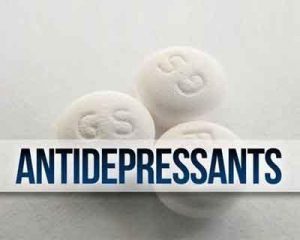- Home
- Editorial
- News
- Practice Guidelines
- Anesthesiology Guidelines
- Cancer Guidelines
- Cardiac Sciences Guidelines
- Critical Care Guidelines
- Dentistry Guidelines
- Dermatology Guidelines
- Diabetes and Endo Guidelines
- Diagnostics Guidelines
- ENT Guidelines
- Featured Practice Guidelines
- Gastroenterology Guidelines
- Geriatrics Guidelines
- Medicine Guidelines
- Nephrology Guidelines
- Neurosciences Guidelines
- Obs and Gynae Guidelines
- Ophthalmology Guidelines
- Orthopaedics Guidelines
- Paediatrics Guidelines
- Psychiatry Guidelines
- Pulmonology Guidelines
- Radiology Guidelines
- Surgery Guidelines
- Urology Guidelines
Antidepressants reduce death in patients with diabetes and depression

The study, published in the Journal of Clinical Endocrinology & Metabolism found that antidepressants, with an exception of the reversible inhibitor of monoamine oxidase A (RIMA), significantly reduces death by more than a third in patients with diabetes and depression. RIMA was found to be associated with an increase, rather than decrease, in total mortality.
According to the U.S. Centers for Disease Control and Prevention, diabetes patients are two to three times more prone to depression than people without diabetes. Diabetes and depression each independently contribute to increasing total mortality.
Vincent Chin-Hung Chen, Professor, of Chiayi Chang Gung Memorial Hospital and Chang Gung University in Puzi, Taiwan, and colleagues conducted this large population-based study to explore the impact of antidepressants on mortality among diabetes patients.
For the purpose, the researchers used the National Health Insurance Research Database in Taiwan. they identified 53,412 patients diagnosed with diabetes and depression since 2000 and followed them until 2013 to determine if the use of antidepressants reduced death.
Also Read: Depression in women linked to cancer, diabetes and heart disease
Key findings of the study include:
- Antidepressants use was associated with significantly reduced mortality by 35 percent among patients with diabetes.
- Differences on mortality existed across antidepressants categories: selective serotonin reuptake inhibitors (HR=0.63), serotonin-norepinephrine reuptake inhibitors (HR=0.58), norepinephrine-dopamine reuptake inhibitors (HR=0.20), mirtazapine (HR=0.60), tricyclic/tetracyclic antidepressants (HR=0.73), trazodone (HR=0.52).
- Reversible inhibitor of monoamine oxidase A (RIMA) was found to be associated with an increase, rather than decrease, in total mortality. (HR=1.48).
Also Read: Diabetes drug improves depression in Parkinson’s disease
"Our findings demonstrated that most antidepressants but not RIMA were associated with significantly reduced mortality among the population with comorbid diabetes and depression," concluded the authors.
To read the complete study log on to https://doi.org/10.1210/jc.2018-02362

Disclaimer: This site is primarily intended for healthcare professionals. Any content/information on this website does not replace the advice of medical and/or health professionals and should not be construed as medical/diagnostic advice/endorsement or prescription. Use of this site is subject to our terms of use, privacy policy, advertisement policy. © 2020 Minerva Medical Treatment Pvt Ltd